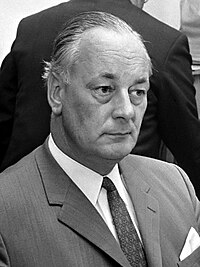Adolf von Thadden
| Adolf von Thadden | |
|---|---|
 |
|
| President of the NPD | |
|
In office 1967–1971 |
|
| Preceded by | Friedrich Thielen |
| Succeeded by | Martin Mussgnug |
| Deputy of the Bundestag | |
|
In office 15 August 1949 – 6 September 1953 |
|
| Constituency | Lower Saxony |
|
In office 16 September 1957 – 1959 |
|
| Constituency | Lower Saxony |
| Senator of the Bundesrat | |
|
In office 7 September 1953 – 15 September 1957 |
|
| Constituency | Lower Saxony |
| Personal details | |
| Born |
July 7, 1921 Gut Trieglaf, Pomerania, Weimar Republic |
| Died | July 16, 1996 (aged 75) Bad Oeynhausen, North Rhine-Westphalia, Germany |
| Nationality | German |
| Political party |
National Socialist German Workers' Party (1939–1945) German Right Party (1946–1950) German Empire Party (1950–1964) National Democratic Party (1964–1975) |
| Relatives | Elisabeth von Thadden (half-sister) |
| Occupation | Politician, landowner, undercover agent (MI6) |
| Military service | |
| Allegiance |
|
| Service/branch |
|
| Years of service | 1939–1945 |
| Rank | Lieutenant |
| Battles/wars | World War II |
Adolf von Thadden (July 7, 1921 – July 16, 1996) was a leading far-right German politician. Born into a leading Pomeranian landowning family – he was born at the noble estate of Gut Trieglaff near Greifenberg in Pomerania – he was the half-brother of Elisabeth von Thadden, a prominent critic of the Nazis who was executed by the Nazi government in September 1944.
Thadden was born into one of Pomerania's oldest Junker families, with his father a prominent local magistrate. He educated at the gymnasium in Greifenberg and subsequently studied agriculture and economics. On 1 September 1939 he became a member of the NSDAP, commonly known as the Nazi Party.
He served as a lieutenant with the Wehrmacht in the Second World War, suffering a number of battle injuries during the conflict. A brigade adjutant in the artillery section, he was captured near the end of the war by Polish forces. Thadden later went to court to sue over rumours that he had collaborated with the Poles during his imprisonment. He was successful in his case.
He escaped captivity in November 1946 and fled to the British Zone of Occupation, finding work with the British Property Control in Göttingen, where he settled.
After the war, Thadden entered politics as a member of the Deutsche Rechtspartei and its successor the Deutsche Reichspartei. As a member of both, he served as a councilman in Göttingen from 1948 to 1958. Elected to the Bundestag in 1949, he was the second youngest member and was thus addressed by an SPD member as 'Bubi', (a nickname that stuck with him). He became the main writer on the party organ Reichsruf, gaining a reputation both for his demagogy and his extensive use of humour and wit. He remained a Bundestag member to 1953 and again from 1955 to 1959, was a Senator from 1952 to 1958 and a member of the Landtag of Lower Saxony from 1956 to 1959.
...
Wikipedia
